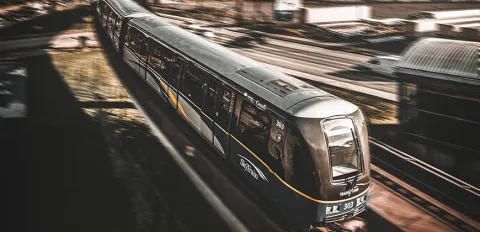Guest Speaker Series: Transportation in the City of Vancouver

- Master of Engineering Leadership
On June 1st, Paul Storer, Director of Transportation with the City of Vancouver, spoke with MEL students about transportation in the city, as well as towards the changes to transportation infrastructure influenced by the COVID-19 pandemic. As pandemic restrictions ease, the presentation gave to the current MEL cohort the opportunity to be able to identify many industry changes and begin to think about a plan moving forward.
Paul Storer and his team are responsible for all aspects of transportation, including planning, design, engagement, operations, and parking management for the City of Vancouver. Storer is a professional engineer with 15 years of experience at the City of Vancouver including multi-modal street design, bike facility planning and design, neighbourhood traffic calming, rapid transit planning, and implementation of the City’s Transportation 2040 plan. His focus over his career has been on city-building, particularly improving transit and active transportation infrastructure and working with development to achieve both transportation and land use goals.
Storer's presentation focused on the City of Vancouver’s Transportation 2040 plan and how COVID has impacted the City’s population and transportation infrastructure. Some of the key outtakes from this were that efficient mobility also creates a wide range of benefits from public health to accessibility.
Storer noted that when thinking about transportation for the City of Vancouver (CoV), and cities in general, one must be aware of seven considerations. These considerations impact the scale, number, and structure of projects, and are project dependent. These are:
- population mobility
- health
- safety
- accessibility
- affordability
- public life
- resiliency
Storer went onto mention that the City of Vancouver has established a hierarchy for individual mobility which focuses on making the following thing modes of transportation more efficient: walking; cycling; transit; taxi, commercial and share transportation; and private automobiles. This hierarchy determines the priority structure for projects, an organizational tool that Storer notes is important for the cohort to utilize to make their projects more efficient for mobility.
Efficient mobility has challenges
Storer continued to highlight these challenges as: regional growth; relocating road space; expanding transit; managing congestion; and affordability.
These challenges require innovative solutions by municipal engineers and planners. These challenges also benefit from the application of the seven considerations the City of Vancouver uses, which is especially true when addressing the COVID-19 pandemic.
Storer then proceeded to outline the impacts of COVID-19 on daily life, which have changed the traditional approaches to transportation and infrastructure.
These impacts included:
- City-wide demand for more public space to support physical distancing and social connection.
- Acute need in disproportionately impacted communities like in the Downtown Eastside.
- Community service providers need more space to deliver services due to social distancing, and other spatial limitations.
- Business closures, including access to services and change in consumption patterns.
- Decreased revenues in a variety of sectors.
In an attempt to address the above, the City of Vancouver initiated the following:
- Flexible, innovative, and expedited patio permitting to enable outdoor dining.
- Allowed alcohol consumption in public spaces like designated parks and beaches.
- Reallocate road space to people-focused public space, which included:
- Enabling safe, shared street use for all modes
- Supporting safe physical distancing
- Creating public spaces accessible to all
- Collaborating with Downtown Eastside service providers, residents, and businesses
- Implementing prioritization for bus transit
The current MEL cohort, and particularly those enrolled in Urban Systems 530, benefited from this presentation as it ties into one of the course’s learning outcomes: understanding the big picture in a rapidly changing urban systems environment and thinking strategically about the decisions that will achieve the multifaceted goals of the project and organization.
The overview presented by Storer allowed the MEL cohort to learn about the issues concerning a changing city given transportation, growth, and unexpected challenges like the COVID-19 pandemic. The pandemic has challenged their traditional approaches and pushed them to think about new solutions, like outdoor spaces, to the ‘new’ normal.
Are you ready to adapt to a changing field? Learn more about the Master of Engineering Leadership.


